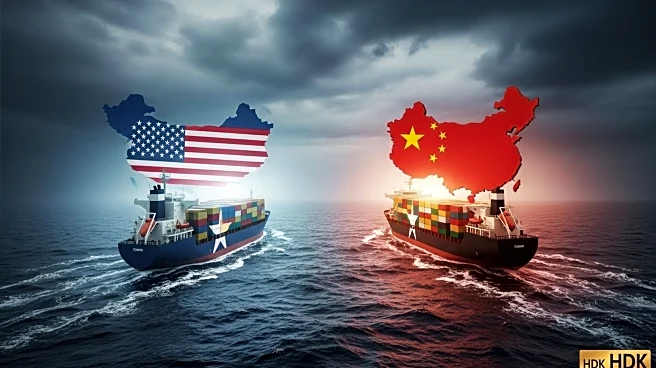What's Happening?
The United States and China have initiated new port fees on ocean shipping firms, marking a significant escalation in their ongoing trade conflict. These fees apply to vessels transporting a wide range of goods, including holiday toys and crude oil, and are part of broader efforts by both nations to exert control over the global maritime industry. The U.S. fees, announced by President Trump's administration, aim to reduce China's influence in maritime logistics and bolster American shipbuilding. In response, China has imposed its own fees on U.S.-linked vessels, exempting Chinese-built ships and those entering Chinese shipyards for repair. This reciprocal action underscores the intensifying trade war between the two largest economies.
Why It's Important?
The imposition of these fees represents a strategic maneuver by both countries to leverage maritime trade as a tool in their broader economic rivalry. The fees could significantly impact global freight flows, potentially leading to increased shipping costs and disruptions in international trade. Analysts predict that major Chinese shipping companies, such as COSCO, will bear substantial financial burdens due to these fees. Additionally, the U.S. has threatened further tariffs and export controls in retaliation against China's restrictions on critical mineral exports. This development highlights the growing use of trade policies as instruments of statecraft, with potential repercussions for global commerce and environmental policy.
What's Next?
The ongoing trade tensions are likely to lead to further retaliatory measures from both sides. The U.S. has already signaled potential sanctions against countries supporting a United Nations plan to reduce greenhouse gas emissions from shipping, a plan publicly backed by China. This could result in additional punitive measures affecting international maritime operations. Companies involved in shipping and logistics may need to adapt to these new regulatory landscapes, potentially influencing global supply chains and trade practices.
Beyond the Headlines
The escalation of maritime fees and trade restrictions could have long-term implications for international relations and global trade dynamics. The weaponization of trade and environmental policies may shift the perception of shipping from a neutral conduit of commerce to a strategic tool in geopolitical conflicts. This could lead to increased scrutiny and regulation of maritime activities, affecting industries reliant on global shipping networks.








